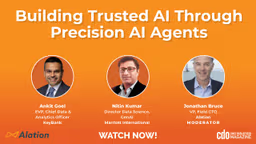AI News Bureau
TE Connectivity CDAIO Reveals the “Secret Sauce” Framework for Driving AI Adoption
Written by: CDO Magazine Bureau
Updated 12:00 PM UTC, Fri October 3, 2025
TE Connectivity, a $16 billion global technology leader, designs and manufactures connectors and sensors that power cars, aircraft, industrial equipment, medical devices, and data centers. With more than 85,000 employees across 140 countries, TE plays a critical role in enabling the connected world. At the center of the organization’s transformation is Elena Alikhachkina, Chief Data and AI Officer, who is spearheading the company’s journey toward AI-enabled growth.
This is the third installment in a three-part series featuring Alikhachkina in conversation with Clyde Gillard, North American AI GTM Leader at HPE. Part 1 explored how TE is unifying its data foundation, while Part 2 examined how to scale AI responsibly from pilots to production. In this final piece, Alikhachkina reflects on people-centered adoption, the promise of agentic AI, and her role in shaping the next generation of AI leaders.
Start with people
Asked about fear and resistance toward AI, Alikhachkina emphasizes that success comes down to putting people first. “This is the secret sauce that will differentiate the companies that will go fast and the companies that will slow down,” she said. “My approach has always been: start from people. Listen to people.”
She points to a framework she learned earlier in her career, the Rapid Value Realization Framework, which she continues to apply at TE Connectivity. The key is to move people away from “jumping straight to solutions” and instead observe how business actually happens.
“My secret sauce is the listening exercise,” she explains. “Maybe go on a sales call, go to the factory, see how it’s working. That ensures the solution will feed the purpose.”
Why agentic AI holds promise
Looking ahead, Alikhachkina believes agentic AI — the use of AI agents embedded directly in business processes — will be transformational. “My belief is in agentic AI because this is connected to the business process and helps speed up the business,” she said.
She cautions, however, against overhyping generative AI for enterprise use cases. “GenAI has been trained on open data. Some companies will say they can put your enterprise query into this — be careful.”
Instead, she stresses the role of strong data foundations. “You need to put your building blocks of data products so you can start solving. Traditional AI is fantastic — it keeps developing. And startups are already building agent data scientists that can generate models automatically.”
Trustworthy data and the role of the CDO
Trust remains a cornerstone of AI success. Alikhachkina argues that organizations must anchor data strategy around their core entities — customers, products, and pipelines — and resist narrow or extractive approaches.
“I don’t like when people say ‘Data is the new oil.’ It gives a bad message. In the old approach, we just kept burning data. But data is a business process,” she says.
She acknowledges the ongoing struggle between business and IT ownership of data. “IT still thinks in systems, while business thinks narrowly about today’s question. There is no middle yet. This is where CDOs are playing a role. But AI is making the gap wider, because some leaders think, ‘I’ll just put in an AI agent,’ without understanding the full connection.”
Shaping the next generation of leaders
Beyond the enterprise, Alikhachkina is deeply engaged in academia, lecturing at universities and mentoring startup founders. She sees it as a way of giving back — and a chance to close the gap between theory and practice.
“We have a wide gap between academia and real life,” she notes. “When I’m teaching, I provide examples of how it really works, and students often tell me, ‘You’re the first teacher who has explained this to us.’”
Her focus is on context. “Your career of the future depends on the context — how information enables processes and how leadership thinking drives them. The majority of business schools don’t even teach data. They may offer some AI classes, but they don’t demystify the full cycle. That’s where I see my contribution.”
Across the three parts of this conversation, Alikhachkina’s message has been consistent: sustainable AI adoption requires strong data foundations, people-centric engagement, and responsible governance. For TE Connectivity, this balance of strategy and execution will be essential in scaling AI to deliver real enterprise value.
CDO Magazine appreciates Elena Alikhachkina for sharing her insights with our global community.





